Daniel Sutter: Sales taxes and Alabama’s future economy
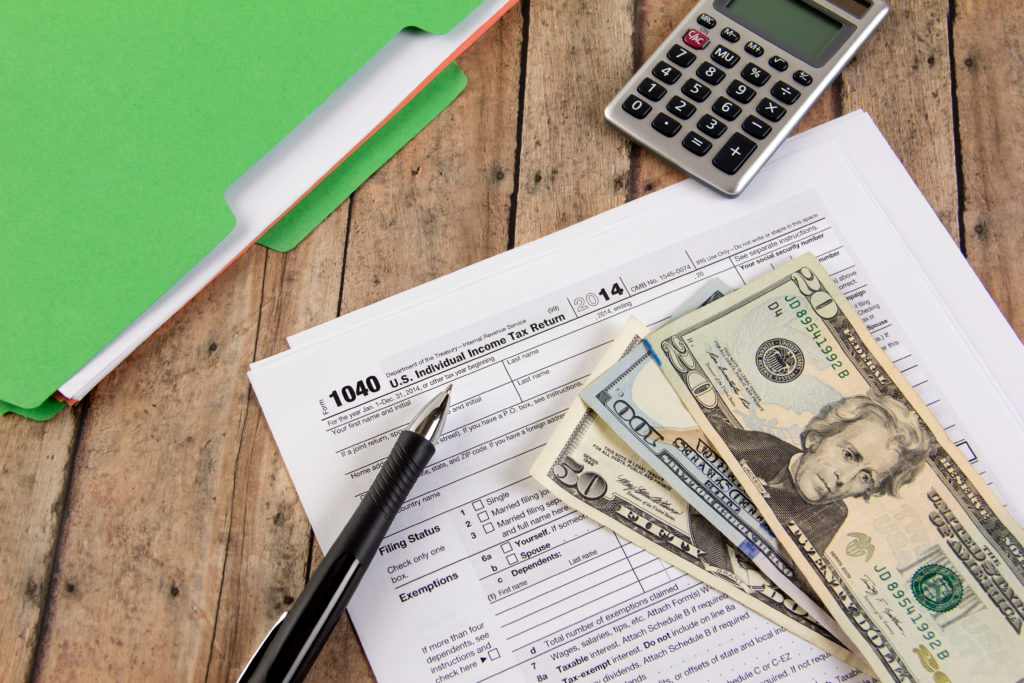
Presidential tweets and a Supreme Court case have reignited the question of taxing internet sales. The Court in April heard arguments in South Dakota v. Wayfair regarding whether a retailer must have physical presence in a state to have to remit sales taxes. The physical presence rule goes back to 1967 and mail order catalogs. E-commerce has been costing state and local governments tax revenue, as South Dakota argued in the case. But instead of trying to collect sales taxes online, perhaps we should abandon a 20th Century economy tax. General sales taxes produced 23 percent of state and local tax revenues nationally in 2015, while “selective sales taxes” on gas, tobacco, and alcohol contributed another 11 percent. Alabama raises 48 percent of our tax revenue from these taxes. Abandoning sales taxes would open a chasm in Alabama government budgets. Economics shows that we will have less of anything which we tax. Taxes affect our behavior, creating a cost beyond the revenue raised for the government. “Optimal tax theory” examines keeping this extra cost as low as possible while raising needed government revenue. Efficiency is not, of course, the only factor for evaluating taxes, as most of us also care about fairness. First widely used in the 1930s, sales taxes readily funded local governments when most people shopped at stores near home. The local sales taxes Alabamians paid went to their city or county government. Times have changed. Sales taxes have always had drawbacks. For one, they are regressive, meaning that taxes as a percentage of family income falls as income rises. Although economists disagree about how progressive taxes should be (with a progressive tax, payments as a percentage of income increase with income), few view regressive taxes as fair. Beyond regressivity, services have also proven hard to tax. Malls and big box stores avoided a local sales tax by locating beyond the city limits. Consumer use taxes, enacted for purchases made without paying sales taxes, have proven cumbersome. High taxes on cigarettes have led to cross-border shopping and smuggling. Online retailing worsened collection problems. Although Amazon now generally collects sales tax, universal collection will be neither easy nor cheap. Differential tax treatment of online and brick-and-mortar sellers raises economic and fairness concerns. Avoiding sales taxes helps keep inefficient online retailers in business. And brick-and-mortar retailers face unfair competition when consumers can avoid sales taxes online. Internet shopping has improved life for shoppers and entrepreneurs. Shoppers can choose from sellers world-wide without leaving the house. Makers of unique products no longer need to rely on mail order catalogs, and social media groups promote the products to interested consumers. The cost of collecting sales taxes for small businesses, however, is substantial: 13 percent of tax revenues for small retailers, versus 2 percent for large retailers. Public service ads today encourage people to shop local retailers to fund local government. But optimal tax theory says we should not let taxes distort economic activity too much. Should we potentially halt the evolution of e-commerce, and all the benefits this may bring, simply because local governments can more easily collect sales taxes from local stores? Our city and county government provide valuable services like police and fire protection, streets, schools, and garbage collection. These services should be adequately funded. I also believe in federalism and want local governments to impose their own taxes. Having Washington collect more taxes and then fund local governments undermines federalism. Alternatives exist for sales tax revenues. In Alabama, our lowest in the nation property taxes represent an alternative. We might want to try pollution taxes, which promise sound environmental policy and could fund government. Should we substantially revamp our tax system? If sales tax collection does not stifle e-commerce, my concern becomes moot. Ultimately government in the United States is supposed to serve our interests. Perhaps sales taxes are as outdated as Sears, Toys-R-Us, and the famous retailers who collected them. ••• Daniel Sutter is the Charles G. Koch Professor of Economics with the Manuel H. Johnson Center for Political Economy at Troy University and host of Econversations on TrojanVision. The opinions expressed in this column are the author’s and do not necessarily reflect the views of Troy University.
Pew study shows Alabama economy slow to rebound after recession

A new study titled Fiscal 50 by the Pew Charitable Trusts, shows that Alabama has one of the slowest economies to rebound after the recession a decade ago. Growth has been uneven throughout the U.S. with North Dakota being the fastest growing, and Connecticut being the slowest. Alabama was shown as being one of the slowest with an annual growth of only .9 percent since the recession in 2007. The study used personal income estimates, and tax revenue data to track economic trends within each state. Personal income growth, one of the main resources for tax revenue growth, has been lagging at a historical pace. From 2007 to 2017 it only rose 1.6 percent a year, compared with the 2.6 percent a year over the past 30 years. “Personal income growth has been uneven over the past decade, tumbling in almost all states in 2009, during the depths of the recession, and falling in most states in 2013 after taxpayers shifted income to avoid a potential federal tax hike. Sluggish growth in 2016 and 2017 reflected personal income drops in a number of states,” said the study. States in the nation have experienced sluggish growth across the board, with little to no extra tax revenue leaving many states with very little wiggle room in their budget, and some states have not experienced a rebound since the recession at all. “Nationally, total state tax revenue recovered in mid-2013 from its plunge during the recession but has rebounded more slowly than after the three previous downturns.” The good news is, nationally, all three major components of personal income; work earnings, transfers (like Social Security benefits), and property income have have risen over the past 10 years, with the effects varying from state to state.
Birmingham launching Bronze Valley initiative aimed at diversifying tech economy
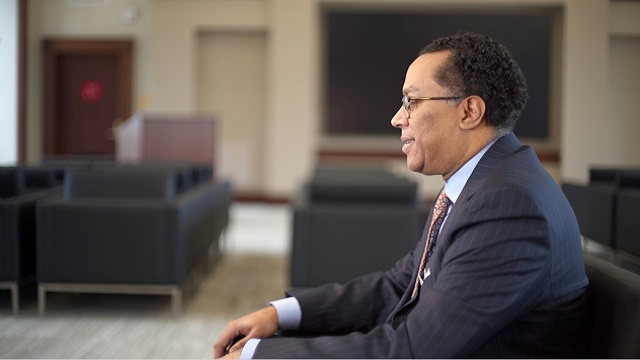
Birmingham is looking to diversify its technology economy through the Bronze Valley initiative that focuses on innovation, diversity and growth. Non-profit Bronze Valley Corp. has identified those as the cornerstones of the next generation of great American cities. “We will be a catalyst for change,” Bronze Valley Executive Director Neill Wright said. A new organization established late in 2017, Bronze Valley is working to create an education-to opportunity-to-outcome pipeline for communities that are underrepresented in technology careers, as entrepreneurs and in other fields where innovators will lead the way in creating the jobs of the future. Bronze Valley launches Wednesday and will provide a rallying point for communities looking to emerge from this era of change as places where potential – both economic and human – becomes reality. The largest city in Alabama and the state’s financial center, Birmingham is situated at the hub of an emerging network of innovation, diversity and growth that spans the Southeast. Building on existing assets while nurturing new ones, Birmingham is positioned to anchor the development of an ecosystem in which technology-based businesses thrive – and where economic opportunity and cultural progress are expanded as part of a strategic, comprehensive, collaborative approach. A veteran of 25 years in banking and finance, Wright said that while Birmingham and Alabama have progressed economically and otherwise, “We can do better.” Attracting capital to support minority- and female-owned startups – and providing mentorship for entrepreneurs – is only part of the picture, he adds. Bronze Valley will bring “innovation, ideas and concentrated thought” to technology-based business development, becoming “a force for improving lives in the community as a whole.” With that in mind, Bronze Valley has a dual mission: generating transformative, sustainable growth expanding the breadth and depth of economic opportunity in Birmingham, throughout Alabama and across the Southeast. “There is a need,” Wright said. “And there is an opportunity to meet that need. As business leaders, we have an obligation to enhance and improve our ecosystem for growth. We can fulfill that obligation by creating an entrepreneurial environment that is more nurturing, more supportive and more inclusive. Bronze Valley is the perfect vehicle for that.” Bronze Valley’s official public launch is Feb. 14 with an invitation-only inaugural conference in Birmingham that will bring together corporate executives, elected officials, entrepreneurs, venture capitalists, policymakers and thought leaders from across the country. The conference will consider long-term solutions for the barriers to diversity that have prevailed in America’s tech growth centers – including the well-publicized diversity struggles of Silicon Valley. Incorporating the commitment to diversity into its economic development strategy is part of what the founders and supporters of Bronze Valley view as a comprehensive approach to building a robust startup culture. The success of that approach will be determined by the level of collaboration Bronze Valley can generate – and sustain – between business, government, primary and secondary education, colleges and universities, nonprofits and community organizations. The success of Bronze Valley will be tracked in real terms: jobs created; companies started, attracted and expanded; improved educational attainment; and growth in minority and female employment in technology fields. But the ultimate indicator of success, organizers say, will be a shift in the way communities think about themselves and their economic prospects, and in how they go about securing a more prosperous future. “It’s about creating and perpetuating a culture of innovation,” said John Hudson, a member of the Bronze Valley board of directors. Hudson is senior vice president of Marketing and Business Development for Alabama Power, a corporate sponsor of Bronze Valley. “Not just in Birmingham and Alabama, but throughout the Southeast, we have the momentum and we have the ingredients,” Hudson said. “With Bronze Valley, we’re putting the collaborative infrastructure in place to support transformational growth and progress.” Hudson points to disparities in the availability of funding and resources available to people of color. For instance, he notes, African-American women are the fastest-growing group of entrepreneurs in America, and yet little more than one-half of 1 percent (0.58 percent) currently obtain startup funding for their businesses or ideas. Hudson said the “culture of innovation” envisioned by Bronze Valley includes turning such disparities into opportunities and positive outcomes. Cities, states and regions that can create that kind of culture – and the individual and collective opportunities it produces – will be well-positioned to take advantage of the changes shaping the economy of the 21st century, officials said. But time is of the essence, they add. “We have to act now,” Hudson said. “This is a critical moment for us if we’re going to take full advantage of what can be accomplished through Bronze Valley. The time is ripe for this idea and the role it can play in creating opportunity, realizing potential and nurturing places where economic development and cultural progress go hand in hand to strengthen entire communities. “That’s what Bronze Valley is about, and those are the things we’re going to accomplish.” Republished with permission from the Alabama NewsCenter.
Martha Roby: Exciting news on the economic front

Regardless of what is dominating the news cycle on any given day, the economy is always an issue on the minds of hardworking Alabamians. The ability to get and keep a job in order to provide for your family is so important. That is why the President, Congress, and local leaders in Alabama have made growing the economy a top priority. There is a lot of exciting news happening on the economic front both nationally and locally. America’s economy is growing faster than even analysts could predict. Alabama is one of thirteen states that have reached a record low unemployment rate, the stock market is at an all-time high, and the U.S. dollar continues to climb. Successful business is the foundation to a healthy economy. A lot of people don’t realize that our effective tax rate for businesses was among the highest in the world before President Trump signed our historic tax reform bill into law. Jobs were being sent overseas and our burdensome tax code was standing in the way of small business growth. We’ve already seen the positive impact of tax reform on our economy and employees. There has been $1.66 billion and counting in new investments made by companies in the U.S. along with more than $1.57 billion in publicly announced employee bonuses to date in response to the Tax Cuts and Jobs Act. Employers like Waste Management, Regions Bank, and many others have said that tax reform is the driving force behind their reinvestment and employee compensation. Alabama has not been left behind in this economic boom, and Governor Kay Ivey highlighted our growing economy in her State of the State address. The Governor and local leaders announced that Toyota and Mazda, in a joint venture, have chosen to build a new plant right here in Alabama. The $1.6 billion assembly plant will employ up to 4,000 workers. Alabama is already the fifth largest producer of cars and trucks in the U.S. with Hyundai in Montgomery, Mercedes-Benz in Tuscaloosa, and Honda in Lincoln. There’s no doubt that Alabama’s proven success over the past two decades in automobile production made it stand out among the other states in the running. In Alabama’s Second Congressional District, Kimber Gun Manufacturing will be coming to Troy, bringing more than 360 new high-paying jobs to our community. In addition to the new jobs this development will bring, the company will invest more than $38 million into our local economy over the span of five years. This is just one of many businesses that have recognized our district’s potential and are adding to our strong manufacturing presence. As you may remember, last month Wayne Farms announced a large expansion of its Enterprise Fresh Processing Facility that will bring nearly 400 jobs to the area. Additionally, Shaw Industries Group, which employs more than 1,000 Alabamians, announced it is investing $184 million into its Andalusia manufacturing facility. The news that the F-35 Joint Strike Fighter is coming to Montgomery’s 187th Fighter Wing at Dannelly Field is also a tremendous boost to our area’s economy. Landing this mission could result in as many as 1,000 jobs and as much as $3 billion in capital investment – and that’s just the beginning. Americans are confident in our economy, and rightfully so. I’m proud of the many steps we have taken in Congress to unleash the private sector and roll back Obama-era rules and regulations that were standing in the way of growth. I will continue to fight for Alabama families and do all that I can to assist local and national efforts to keep this momentum going. ••• Martha Roby represents Alabama’s Second Congressional District. She lives in Montgomery, Alabama with her husband Riley and their two children.
Daniel Sutter: Give thanks for prosperity

This is the time to give thanks, and I hope that your family has much to be thankful for this year. Thanksgiving offers a time to reflect on the prosperity we enjoy. Most humans throughout history have lived at the subsistence level, usually only one poor harvest away from facing famine. Just as with the Pilgrims, our prosperity today has a basis in property rights. The Pilgrims enjoyed bountiful harvests after moving from collective to private farms, while today secure property rights allow the market economy to flourish. We have an additional reason to be thankful this year, as America’s economic freedom increased in the most recent Economic Freedom of the World report. Many economists starting with Adam Smith have recognized property rights and markets as creating the “Wealth of Nations.” Without a comprehensive measure of economic freedom, the link between markets and prosperity was difficult to establish. The Cold War offered the example of free and prosperous West Berlin next to poor communist East Berlin, but we would prefer more systematic evidence. In the 1990s, Canada’s Fraser Institute, on the suggestion of Milton Friedman, started measuring how closely a nation approaches the ideal of free markets. Index scores go from 0, the least freedom, to 10, the most. Hong Kong remains the freest nation (at 8.97), while Venezuela is least free (at 2.92). Dozens of studies have now shown that more economic freedom produces prosperity, faster economic growth, lower inequality, longer life expectancy, and higher environmental quality. Economic freedom in the U.S. rose from 7.81 to 7.94 in 2015, the latest year for which data are available, moving us from 13th freeist nation to the 11th. The Index rates nations on government spending, taxes, the legal system and property rights, monetary policy, international trade, and regulation. Our biggest improvement in 2015 was in monetary policy, due to lower inflation. The Fraser Institute always seeks to improve the freedom index. A major new improvement debuting this year is an adjustment for the economic freedom of women. The case for adjusting the Index for discrimination against women is overwhelming. All people have the right to apply their skills and talents in whatever peaceful endeavors they choose. As TCU economist Rosemarie Fike writes in this year’s report, “All human beings have a right to be free, to make their own decisions, and ends of their own life course.” Further, our economy will be more prosperous if the talents and abilities of everyone can be employed. The challenge has been obtaining data on the economic status of women in enough countries and back to 1970, the first year for which we have economic freedom scores. The World Bank’s Women, Business, and the Law project has made this data available. The legal system and property rights component of the freedom score is adjusted using a Gender Disparity Index based on legal restrictions on women’s ability to own property or enter into contracts. Discrimination against women most affects economic freedom in Middle Eastern nations like Saudi Arabia, the United Arab Emirates, Kuwait, and Jordan. The World Bank does not measure cultural restrictions on women’s achievements. Stereotypes and criticism can hold people back as surely as the law. The economic freedom index more broadly, however, focuses on formal, legal limits. Two interesting gender disparity patterns emerge. First, the average level of legal discrimination against women has been falling over time. This is encouraging, although it would be great if equality were achievable today. Second, countries with more economic freedom, apart from the gender adjustment, discriminate less against women. I think that the driving force is recognition that ordinary people (as opposed to just rulers) matter. Once we recognize that people matter, the conclusion that everyone matters, including women and minorities, naturally follows. Property rights helped make the first Thanksgiving possible back in the Plymouth colony. We should give thanks for living in a time and place where economic freedom has made prosperity possible. And this year in the U.S., we have a little more economic freedom to celebrate. So please pass the turkey! ••• Daniel Sutter is the Charles G. Koch Professor of Economics with the Manuel H. Johnson Center for Political Economy at Troy University and host of Econversations on TrojanVision. The opinions expressed in this column are the author’s and do not necessarily reflect the views of Troy University.
Improving world economy still needs help from low rates
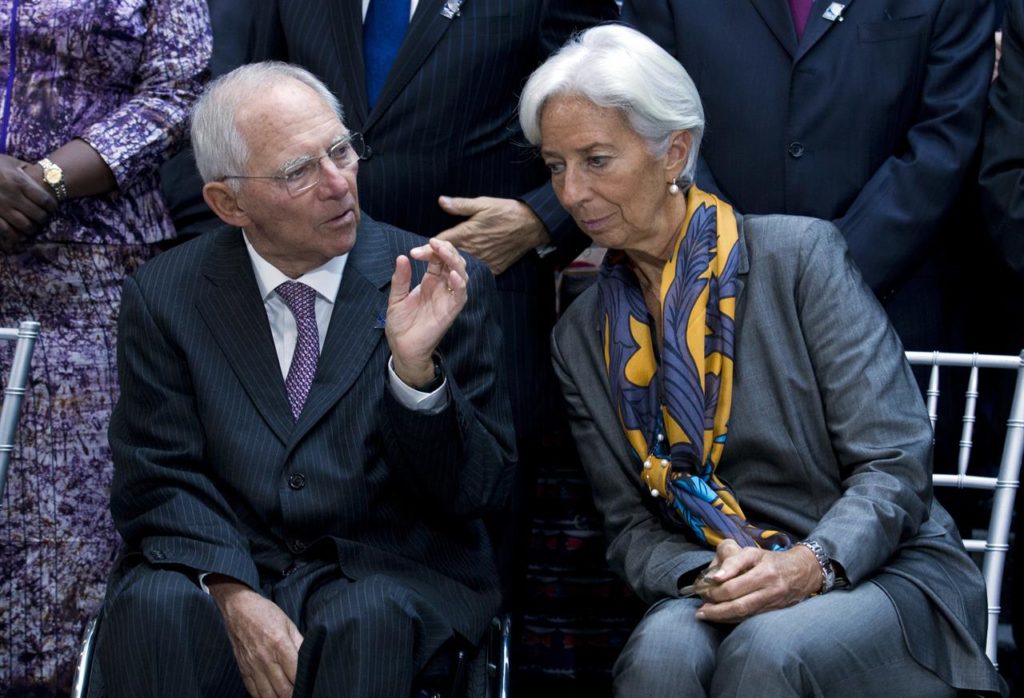
The world economy is the healthiest it’s been in years but could still use a little help from low-interest rates and higher government spending from countries that can afford it, the International Monetary Fund says. “There was a strong consensus that the global outlook is strengthening,” said Agustin Carstens, governor of the Bank of Mexico and outgoing chair of the IMF’s policy committee. “This does not mean we are declaring victory just yet.” The 189-member IMF and its sister agency, the World Bank, wrapped up three days of meetings Saturday. The IMF expects the global economy to grow 3.6 percent this year, up from 3.2 percent in 2016. And three-quarters of the global economy is growing, making this the broadest recovery in a decade. But IMF and World Bank officials pointed to risks that could derail global growth. Geopolitical risks are rising, including a confrontation between the United States and North Korea over Pyongyang’s nuclear weapons program. The income gap between rich and poor is growing, fueling political discontent with the free trade and global cooperation that the IMF and World Bank promote. So in a communique Saturday, the IMF’s policy committee called on world central banks to protect the fragile global recovery by keeping interest rates down in countries where inflation is too low and economies are performing below potential. IMF officials have also urged some countries with healthy finances – such as Germany and South Korea – to make investments that will spur growth. IMF Managing Director Christine Lagarde appealed to countries to enact reforms that will make their economies more efficient and spread prosperity to those who have been left behind. Specifically, Lagarde argued that countries could improve their economies and reduce inequality by putting more women to work, improving their access to credit and narrowing their pay gap with men. On Saturday, Ivanka Trump, the president’s daughter and a White House adviser, appeared with World Bank President Jim Yong Kim to launch a World Bank initiative to support women entrepreneurs. The World Bank fund has raised $350 million which is designed to allow the World Bank to deploy at least $1 billion in capital to finance women-owned businesses. Ivanka Trump told the audience that she wanted to “spend a lot of time offering any value that I can as a mentor.” The World Bank and IMF delegates are still adjusting to the Trump administration, which is skeptical of international organizations and contemptuous of free trade agreements. This week, the United States pulled out of UNESCO, the United Nations’ cultural agency. It is has balked at providing additional capital to the World Bank unless the anti-poverty agency rethinks the way it distributes loans. It has scrapped an Asia-Pacific trade deal and is threatening to pull out of the North American Free Trade Agreement with Canada and Mexico. Treasury Secretary Steven Mnuchin said he carried in his pocket a list of all the G-20 nations and the size of the trade balances the United States has with each of those nations. With most of the G-20 countries, the United States is running a trade deficit. In a speech Saturday to the IMF policy group, Mnuchin said he wanted to see the IMF be a more “forceful advocate” for strong global growth by taking a harder look at countries that abuse world trade rules. Republished with permission from the Associated Press.
Business Alabama publishes 2018 Economic Development Guide
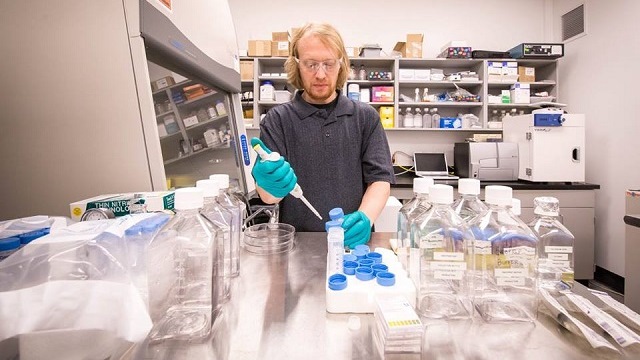
Alabama’s economy is more diverse than ever, thanks to major new developments in industries ranging from agriculture to aerospace and everything in between, according to Business Alabama. The publication’s new 2018 Economic Development Guide provides an in-depth examination of the important trends and developments that are reshaping the economic landscape of Alabama. The 96-page guide takes a comprehensive look at significant developments in each of Alabama’s geographic regions, explores what’s taking place in the state’s key industrial sectors and assesses changes in incentives, workforce development and other important topics. To get a full look at how Alabama’s economy is evolving, check out the 2018 Economic Development Guide. Republished with permission from the Alabama NewsCenter.
Bradley Byrne: Tax reform will grow the American economy

Last week, the House took a big step toward long overdue tax reform when we passed our budget for Fiscal Year 2018. The budget is important because it opens up the process by which we can bypass a Democrat filibuster and pass tax reform with 51 votes in the Senate. If you read last week’s column, you know that the unified Republican tax plan will benefit working families by lowering tax rates, increasing the standard deduction, expanding the child tax credit, and simplifying the entire tax code. Under our plan, most Americans would be able to do their taxes on a single, small postcard. For me, the top priority of tax reform is to make things easier for working families who deserve to keep more of their hard-earned money in their pockets instead of sending it to the federal government. That will remain my main goal throughout the process. At the same time, tax reform also allows us to level the playing field for small businesses and promote economic growth. When the American economy is stronger, American families are stronger. Many things have changed since we last had tax reform in 1986. Unfortunately, for the most part, the way we tax businesses has not. With this in mind, our tax reform plan strives to help small businesses, which are the backbone of the American economy. Most small business owners and job creators say that the current confusing and burdensome tax code is one of the biggest challenges they face. Under our plan, the top tax rate applied to the business income of small and family-owned businesses conducted as sole proprietorships, partnerships, and S corporations would be 25%. This is significantly lower than the top rate these businesses pay today. Most Americans work for these Main Street businesses, and lowering the small business rate will produce a boom of economic activity and more American jobs. Our plan also calls for a reduction in the corporate tax rate to 20%. Our current corporate tax rate is the highest in the industrialized world and has resulted in businesses shipping jobs and revenues overseas. This is why lowering the corporate rate is a key part of President Trump’s economic agenda. As another way to help spur economic growth, our plan would allow businesses to deduct 100% of the money they spend on capital investments for at least the next five years. This will incentivize businesses to buy heavy machinery and equipment that is necessary to really jumpstart our economy. Importantly, our plan also focuses on leveling the playing field and closing loopholes that only benefit the well-off and well-connected. Another key piece of our plan centers around bringing jobs and businesses back to America. We want to move from the current “offshoring model” that has been a disaster for American workers toward an “American model” that encourages more companies to do business in our country. We do this by ending the current tax code’s disincentive for companies that want to bring wealth they have earned overseas back to the United States. Foreign profits already accumulated offshore will be subject to a low, one-time tax. This will bring money flowing back into America. By creating a more business-friendly tax code, more jobs will be created and greater opportunities will exist for the American people. Again, a stronger economy leads to a stronger America where everyone benefits. Of course, our tax reform plan must still go through the legislative process and changes will likely occur. I also want your feedback to hear what concerns or ideas you have regarding our tax reform plan. You can find the plan online at FairAndSimple.gop. • • • Bradley Byrne is a member of U.S. Congress representing Alabama’s 1st Congressional District.
Delta Regional Authority to invest $1 million in Alabama’s infrastructure, economy

Alabama Gov. Kay Ivey and the Delta Regional Authority (DRA) on Tuesday announced more than $1 million in new DRA investments to strengthen Alabama’s workforce, infrastructure, and economy. DRA’s investments will support public and private partnerships and bring $7.1 million in new investment to Alabama. “The Delta Regional Authority is an essential partner to Alabama in helping us meet the needs of the most rural parts of our state,” Ivey said in a statement. “By investing more than $1 million in our state, DRA is helping rural communities strengthen their infrastructure, improve economic opportunities, and increase access to important cultural enhancements.” The investments were made through the DRA States’ Economic Development Assistance Program (SEDAP), the agency’s main federal funding program that invests in basic public infrastructure, transportation infrastructure, workforce development, and small business and entrepreneurship projects. “These investments in Alabama align with DRA’s efforts to help create new jobs, support infrastructure improvements and create job opportunities,” added DRA alternate federal co-chairman Peter Kinder. “Our resources will provide sanitary sewer services to rural residents, build community capacity and help attract new businesses to the Black Belt of Alabama. This effort highlights DRA’s ability to build public-private partnerships to invest in the future of the Delta region.” Below is the complete list of DRA’s Alabama investments: CITY OF MONROEVILLE: Industrial Park Building Enhancement. DRA Investment: $256,500. Total Investment: $2,256,500. DRA’s investment will support a new production facility fully equipped with the most modern digitally controlled, special effect and package printing press. 60 new jobs will be added. TOWN OF CARROLTON: Sewer System Improvements. DRA Investment: $180,000 (100%). Carrollton will use this investment to address major deficiencies in the town’s wastewater treatment system and improvements will be made to prevent the failure of its wastewater system, address regulatory and compliance issues, and allow the town to provide sanitary sewer service to residents and businesses. CITY OF TUSKEGEE: Infrastructure project to attract commercial investment. DRA Investment: $280,000. Total Investment: $1,800,000. This project will advance the area’s economic competitiveness and productivity of the workforce. DRA’s investment will result in the immediate creation of 35 jobs for predominantly low and moderate income persons, promote economic development to increase the city and county tax base and enhance Exit 38 as a gateway to the City of Tuskegee. CITY OF CAMDEN: Improvements to Bridgeport Park. DRA Investment: $200,000. Total Investment: $400,000. DRA’s investment will help improve and expand the City of Camden’s infrastructure to support existing economic development initiatives and benefit the local business community. CITY OF SELMA: Arts and Culture Development. DRA Investment: $58,424. Total Investment: $133,424. DRA’s investment into the ArtsRevive Community Development Corporation will support advancement of the Carneal Cultural Arts Center. This effort will increase tourism, foster entrepreneurism in the local cultural arts and anchor creative placemaking activities to energize and improve the downtown economic corridor. CITY OF CAMDEN: Rural transportation program investment.DRA Investment: $29,328. Total Investment: $146,640. DRA funding will support the Alabama Tombigbee Regional Commission’s efforts to expand its Job Access and Reverse Commute (JARC) program that provides various transportation needs to low- and moderate-income residents seeking to obtain and maintain employment. PERRY COUNTY: Infrastructure Improvements. DRA Investment: $42,000. Total Investment: $2,202,000. DRA’s investment in Perry County will provide safe roads for employees to commute to and from their jobs and maintain the suitability of roads for local businesses, having a positive impact on the local economy. The project will provide full depth reclamation, paving, striping, and traffic markers for 9 miles on County Road 12. Alabama is one of only eight states to receive DRA investments. The agency’s total investments in the Mississippi River Delta Region and Black Belt of Alabama will reach $20 million in 2017. With contributions from public and private partners, total investments will be $231.6 million. The state’s congressional delegation welcomed the news. “This new funding will continue to spur economic growth and opportunities in rural Alabama,” explained U.S. Sen. Richard Shelby. “Monroeville, Carrolton, Tuskegee, Camden, Selma, and Perry County, as well as the entire state, will benefit from these investments, and I am grateful for the partnership Alabama continues to have with the DRA.” “I applaud the Delta Regional Authority for their continued investment in Alabama’s rural communities, including their help funding the enhancement of the industrial park in Monroeville,” Alabama 1st District U.S. Rep. Bradley Byrne said. “These investments will help spur economic development, boost infrastructure, and increase the quality of life for Alabama’s citizens. I pledge to continue working with the Delta Regional Authority and community partners to benefit our state’s communities.” Alabama 7th District U.S. Rep. Terri Sewell agreed — the funds are going to make a big impact on rural communities. “The Delta Regional Authority’s generous investment in the state of Alabama is going to have an immediate impact for our rural communities,” Sewell echoed. “Today’s announcement takes a step towards addressing some of the most pressing issues in rural Alabama, such as infrastructure development and job growth, while also facilitating creative arts programs and boosting tourism.” “I am pleased to see these economic investments being made – especially in Tuskegee – where good paying jobs can be hard to find,” Alabama 3rd District U.S. Rep. Mike Rogers commented. “Enhancing Exit 38 off of I-85 is a welcomed improvement, and I appreciate DRA investing in East Alabama.”
Martha Roby: Let’s not squander our economic momentum

Cable news might not show it these days, but there are actually great things happening in this country. For one thing, our economy is seeing significant and steady growth, and that’s good news for everybody. Did you know that the economy grew by 156,000 jobs last month? The month before that it grew by more than 200,000 jobs. Did you know that more than 1.3 million jobs have been created just this year? Despite all the division and bitterness that exists on television and social media, I really believe most people are primarily concerned with their ability to get and keep a job so they can provide for their family. I’m encouraged by our economic momentum, but there are some major challenges ahead that will determine whether we will build upon it or squander it. One challenge is our health care system. Letting it continue to fail is not an option. This is an issue Republicans have been campaigning on for seven years, yet when it came time to get it done, the divisions emerged in a pretty stark way. Part of that is the legislative process – we are supposed to disagree, debate, and refine legislation. I’m glad we ultimately passed our Obamacare repeal bill in the House, but after watching what happened in the Senate, it is clear that a broader coalition must be built in order to carry this progress over the finish line. We can’t afford not to get this right, so count me as someone who is ready to roll up my sleeves and get the job done. Another challenge is comprehensive tax reform. The potential that pro-growth tax reform holds for our economy is almost limitless. I believe we need to lower tax rates for every taxpayer so that Americans can keep and invest more of what they earn. We should also lower corporate tax rates to be globally competitive while also closing the loopholes built into the tax code to keep from paying our current high tax rates. Finally, we should clean house at the IRS and make the agency work for the taxpayers, not against them. Another challenge is the nation’s aging infrastructure. Having reliable roads, bridges, ports, and railways is fundamental to our ability to do business, but I’m afraid we haven’t done enough to properly maintain them. If we make these appropriate investments right now and enhance rural broadband access, we can turn what is a serious liability into major strength for our state and our country. One challenge that is critically important, but hasn’t received the attention it deserves, is our skyrocketing national debt. We are now nearly $20 trillion in debt, and I’m worried about how that is going to affect our economic future and the lives of our children and grandchildren. I voted against the latest plan to raise our nation’s debt limit because the proposal did not contain any reforms to curb federal spending. Congress has no business raising the debt limit without reining in the runaway spending that is causing our debt problem. Every day I hear from constituents who are concerned about our nearly $20 trillion in debt and frustrated by Washington’s unwillingness to address it. The problem won’t be easy to solve, but we have to try. The deal that just passed is temporary, so we will have another opportunity to enact spending reforms later this year. I sincerely hope we can negotiate a responsible agreement that will help put our country on a more sustainable financial path. Our country has strong economic momentum building. I will do everything I can to ensure that we capitalize on these historic opportunities and not squander them. ••• Martha Roby represents Alabama’s Second Congressional District. She lives in Montgomery, Alabama with her husband Riley and their two children.
Survey: Small business owners lose some post-election cheer

Small business owners have lost some of their post-election optimism, according to a survey released Thursday by Wells Fargo & Co. The bank’s quarterly small business index, based on a survey taken in early April, dropped to a reading of 95 from 100 at the start of 2017 and 80 in the fourth quarter. Other small business surveys had also shown a surge in optimism after the election and the inauguration of Donald Trump. The Wells Fargo survey may reflect more pessimism in response to the economic slowdown they felt in the first quarter. Government figures showed the U.S. gross domestic product grew at an anemic 0.7 percent annual rate in that period. Much of the decline in the bank’s index came from owners’ assessments of current financial conditions. The 603 owners surveyed also had lowered expectations for their revenue in the next 12 months. Fifty-seven percent expected to have revenue gains, down from 61 percent in the first quarter. Hiring expectations did tick up, with 31 percent planning to increase their payrolls versus 29 percent in the fourth quarter. Small business job creation has been erratic over the past year; on Wednesday, payroll provider ADP said its small business customers added 61,000 jobs in April, down from March’s 117,000. Hiring forecasts have also varied widely in recent months — the Wells survey is more optimistic than one from Bank of America last week that saw 18 percent of owners expecting to hire, down from 25 percent six months ago. Republished with permission of The Associated Press.
Senate confirms Alex Acosta as Donald Trump’s secretary of labor
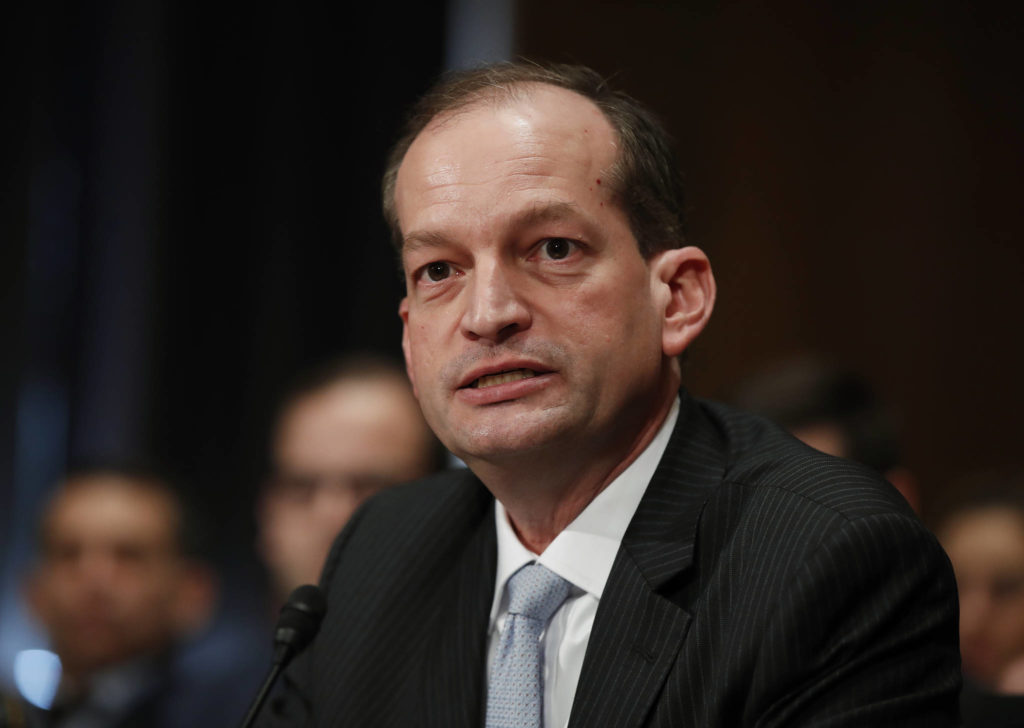
The Senate on Thursday confirmed Alex Acosta as Labor secretary, filling out President Donald Trump‘s Cabinet as he approaches his 100th day in office. The 60-38 vote confirms Acosta to the post. Once sworn as the nation’s 27th Labor secretary, the son of Cuban immigrants will lead a sprawling agency that enforces more than 180 federal laws covering about 10 million employers and 125 million workers. Sen. Tim Scott, R-S.C., spoke for many Republicans with a statement issued just after the vote saying he hopes Acosta’s focus will be “promoting labor policies that are free of unnecessarily burdensome federal regulations.” Scott said he wants Acosta to permanently revoke rules governing financial advisers and adding Americans eligible for overtime pay. Democrats said any Labor secretary should advocate for the American workers to whom Trump promised so much during his upstart presidential campaign. They said Acosta has given no such commitment. “Acosta failed this basic test,” tweeted Sen. Elizabeth Warren, D-Mass. Acosta has been a federal prosecutor, a civil rights chief at the Justice Department and a member of the National Labor Relations Board. He will arrive at the top post with relatively little clear record on some of the top issues facing the administration over key pocketbook issues, such as whether to expand the pool of American workers eligible for overtime pay. Acosta wasn’t Trump’s first choice for the job. Former fast food CEO Andrew Puzder withdrew his name from consideration last month, on the eve of his confirmation vote, after becoming a political headache for the new administration. Puzder acknowledged having hired a housekeeper not authorized to work in the U.S. and paying the related taxes years later — after Trump nominated him — and came under fire from Democrats for other issues related to his company and his private life. Acosta’s ascension would come at a key moment for Trump, just two days before he reaches the symbolic, 100-day marker. The White House has sought to cross the threshold with its own list of Trump’s accomplishments. Trump can say the Acosta vote was bipartisan, because eight Democrats and one independent voted yes. Joining the Republicans in his favor were Democratic Sens. Catherine Cortez Masto of Nevada, Heidi Heitkamp of North Dakota, Joe Manchin of West Virginia, Claire McCaskill of Missouri, Bob Menendez of New Jersey, Bill Nelson of Florida, Jon Tester of Montana and Mark Warner of Virginia. Independent Sen. Angus King of Maine also voted for Acosta. Labor secretary is the last Cabinet post for Trump to fill. Trump’s choice for U.S. trade representative, a job considered Cabinet-level, is awaiting a Senate vote. From the beginning, Acosta’s was a quiet march to confirmation that stood out because it didn’t attract the deep partisan battles faced by some of Trump’s other nominees, including Education Secretary Betsy DeVos and Secretary of State Rex Tillerson. Justice Neil Gorsuch‘s nomination provoked such a fight that majority Senate Republicans used the “nuclear option” to remove the 60-vote filibuster barrier for Supreme Court picks. Thursday’s vote marks the fourth time Acosta has been confirmed for the Senate. Democrats and most labor groups were mostly muted in their response to Acosta’s nomination. At his confirmation hearing, Democratic Sens. Patty Murray of Washington and Warren hammered Acosta for answers on a selection of issues important to labor and whether Acosta would cave to political pressure from Trump. Acosta refused to answer the policy questions until he’s confirmed, and he vowed to be an independent and fair voice for workers. Both senators said they had great concerns, and both voted no. Our standard can’t be ‘not Puzder,’” Murray said Wednesday on the Senate floor. But tellingly, even as Acosta’s nomination wound through the Senate, Democrats and their allies also tried to move on to other, labor-related issues — namely, a minimum wage hike to $15 an hour, which Trump opposes. Meanwhile, the Labor Department’s online landing page bears a glimpse of Acosta’s policy priorities: “Buy American, Hire American.” That’s the title of Trump’s executive order this week directing the secretaries of labor and other agencies to issue guidance within 60 days on policies that would “ensure that, to the extent permitted by law” federal aid “maximize the use of materials produced in the United States, including manufactured products; components of manufactured products; and materials such as steel, iron, aluminum, and cement.” Republished with permission of The Associated Press.


